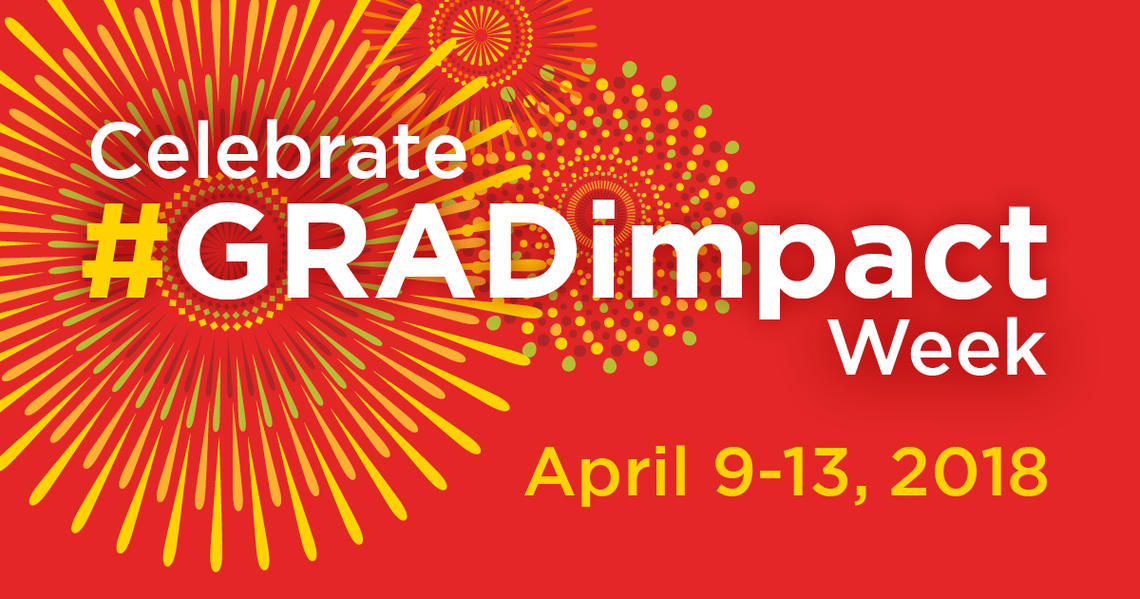
#GRADimpact Week Poster.
April 9, 2018

#GRADimpact Week Poster.
GRADimpact week is a time to tell the stories of our grad students and their research, and to shine a light on their many contributions to the University of Calgary and the broader community.
“Here on campus, we know that graduate students are essential to moving research forward. We’ve started GRADimpact week to get the message out to the Calgary community that the innovative work our graduate students are doing is solving problems that matter to people in Calgary, and beyond,” says Lisa Young, vice-provost and dean of Graduate Studies.
Consider the case of civil engineering PhD student Rania Hamza, who is making waves in industrial wastewater treatment, a major source of pollution. To solve the problem of high-strength industrial wastewater created in textile production, oil refining, and other manufacturing industries, she is training bacteria to consume these destructive wastes leaving only CO2, water and heat as byproducts. Hamza’s work is only one example of the innovative ways UCalgary graduate students are addressing environmental challenges.
Juan Pfeiffer’s graduate research has already made a tangible difference to Peavine, an Indigenous community north of Grand Prairie. The capstone project for his MSc in UCalgary’s innovative Sustainable Energy Development program involved working with the community to obtain a grant to install solar panels on the community arena, reducing operating costs and making the community a little greener. Today, Pfeiffer is working with the Government of Alberta to find new ways of making green technologies accessible to Indigenous communities.
Grad students also apply their knowledge and expertise to improve the quality of life in our communities. Suzanna Crawford, a master’s student in nursing, and Michael Purday, a master’s student in biomedical engineering, collaborated to create a startup called Enable. Families of people with disabilities sometimes struggle to find caregivers, and can be overwhelmed just knowing where to start. Enable answers this need by creating a community for people of all abilities, connecting caregivers with families needing support.
One of the common misconceptions about graduate education — especially the PhD — is that it only prepares students to become professors. Susan Porter, dean of graduate studies at the University of British Columbia, points out, "Graduate education provides the framework, mentorship, experience, and rigorous assessment that help to ensure the intellectual development that brings depth, nuance, critical thinking, and creativity to our community across all sectors." Career options for grad students are varied and exciting, precisely because their education prepares them for it.
A key message for GRADimpact week is that graduate education is essential for diversification of the Alberta economy. UCalgary is responding to the need for highly qualified personnel in the tech sector, with new micro-credentials being offered in data science, Information security and network security, as well as graduates of master's and doctoral programs in computer science, electrical and software sngineering, and other related fields.
Diversification demands entrepreneurs and innovators. Freely available professional development and entrepreneurship programs like those offered through My GradSkills and the Hunter Hub help ensure grad students have the tools and skills to pursue rewarding careers.
Ehsan Hosseini is an innovator whose work could radically change the automotive and aerospace industries. Hosseini’s entrepreneurial PhD in chemical and petroleum engineering focuses on developing an ultra-thin film that will conduct electricity and work as a heat source. Windshields and other surfaces coated in this polymer film will de-ice quickly and effectively. The implications are incredible, if you think about how much time you’ve spent this winter scraping your car windshield, or sitting on a tarmac as the plane you’re on is de-iced.
Whether they are leaders in professions like education, social work or nursing, artists contributing to the cultural life of the city, or innovators pushing the boundaries of technology, UCalgary graduate students are having an impact on the quality of life for Albertans.
To read more #GRADimpact stories this week, follow the Faculty of Graduate Studies on social media, Twitter (@UCalgaryFGS) and Facebook.